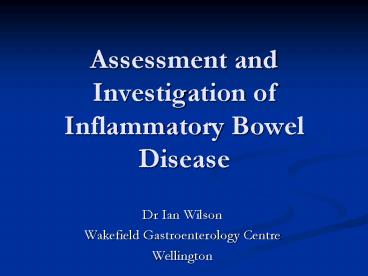Assessment and Investigation of Inflammatory Bowel Disease - PowerPoint PPT Presentation
1 / 34
Title:
Assessment and Investigation of Inflammatory Bowel Disease
Description:
offers complete colonic exam in patients with tortuosity or tumor that may ... extent of small intestinal disorders such as Crohn's disease or Coeliac Disease ... – PowerPoint PPT presentation
Number of Views:643
Avg rating:3.0/5.0
Title: Assessment and Investigation of Inflammatory Bowel Disease
1
Assessment and Investigation of Inflammatory
Bowel Disease
- Dr Ian Wilson
- Wakefield Gastroenterology Centre
- Wellington
2
(No Transcript)
3
(No Transcript)
4
Classification of IBD
5
(No Transcript)
6
(No Transcript)
7
Risk Factors
- Age
- Family history
- Smoking
8
How to diagnose IBD
Typical symptoms Abnormal blood tests
Atypical symptoms Abnormal blood tests
Typical symptoms Normal blood tests
9
Ulcerative colitis
Diarrhoea Often blood Mucous Abdominal
pain Urgency Incontinence Nocturnal
diarrhoea Extra colonic
10
Crohns Disease
- Similar to UC
- plus
- Anal disease
- SI disease
- malabsorption
- Fistula
- Strictures
11
Role of imaging
- Establish the diagnosis
- Distinguish UC from CD
- Stage the disease
- Assess disease activity
- Establish extent of disease
- Cancer surveillence
12
Tools to investigate IBD
- Sigmoidoscopy
- Endoscopy
- Colonoscopy
- Gastroscopy
- ERCP
- Enteroscopy
- Wireless capsule endoscopy
13
Tools to investigate IBD
- Radiology
- Barium studies
- CT scanning
- CT colonoscopy
- MRI scanning
- Nuclear Medicine
14
Tools to investigate IBD
- Histology
15
Endoscopic Assessment
16
Colonoscopy
17
CT colonoscopy
18
CT colonoscopy
- Advantages
- less invasive and safer with no perforation or
sedation risks - no sedation needed
- substantially lower cost
- offers complete colonic exam in patients with
tortuosity or tumor that may prevent passage of a
colonoscope - can assess colonic wall thickness and structures
outside the colonic lumen - Disadvantages
- not entirely noninvasive - requires rectal tube
and insufflation - same cleansing prep as for colonoscopy
- inability to perform biopsy of suspicious
findings at time of exam may require additional
follow-up conventional colonoscopy - less sensitivity for detection of very small
polyps and superficial mucosal abnormalities than
with colonoscopy - Radiation exposure
19
MR Colography
20
Comparison
21
Comparison
22
The small intestine
23
Small Intestine
24
Wireless capsule endoscopy
Optical dome Lens holder Lens Illuminating LEDs
(light emitting diodes) CMOS (Complementary
Metal Oxide Semiconductor) image Battery ASIC
(Application Specific Integrated Circuit)
transmitter Antenna Dimensions Height 11mm
Width 26mm Weight 3.7gr
25
(No Transcript)
26
GE Junction
Duodenum
Jejunum
Ileocecal Valve
27
Phlebectasia
AVM
Lymphangectasia
Bleeding Lesion
28
Lymphoma
GIST
Polypoid Mass
Polyp
29
NSAID stricture
Radiation Enteritis
Sprue
Villous Drop Out
30
Indications
- Obscure gastrointestinal bleeding
- Evaluation of extent of small intestinal
disorders such as Crohns disease or Coeliac
Disease - Abnormal small intestinal imaging
- Suspected malabsorption
- Surveillance of polyposis syndromes involving
small intestine
31
Subtle Findings
- White tipped villi - a sign of inflammatory or
infiltrative change - Q-tip lesion
32
Ileitis
Inflammatory polyp
Crohns disease
Linear Erosions
33
Why Perform Wireless Capsule Endoscopy for IBD?
- Diagnosis
- Differentiate UC from Crohns disease
- Different natural history
- Different medical and surgical therapies
- Evaluate extent of small intestinal involvement
- Determine disease activity
34
The future
- Chromo endoscopy
- MR colography and enterography
- Intestinal permeability calprotectin
- NON INVASIVE































